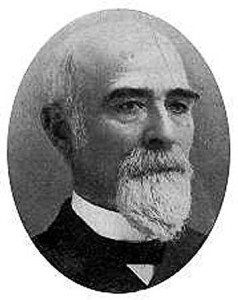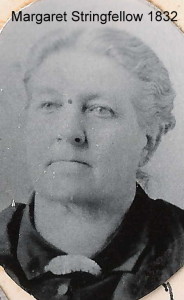(photos from familysearch.org; story from Gary & Rebecca Walker files)
by Margaret P. Petersen (Edited for continuity by Gary Lee Walker)
John Thornley was born February 8, 1833, at Bolton, Lancashire, England, the son of John Thornley and Helen Langton.
Margaret Stringfellow was born July 6, 1833, at Wigan, Lancashire, England, the daughter of William Stringfellow and Elizabeth Benson. They were married about 1833 in England, and received their endowments and sealings in the Endowment House in Salt Lake City in November of 1862.
I have no account of their conversion, either written or oral, so I do not know when they accepted the gospel.
The following account is from the memory of my mother, with some additions and corrections by others of the family.
John and Margaret crossed the plains with a hand cart company, arriving in Utah in September of 1859. One month later they came to Smithfield with their brother, Robert Thornley, and his wife, and a cousin, Seth Langton, and his wife. Robert Thornley had come to Utah in 1855. I can imagine the relief they felt, knowing the long journey was at an end. Also, I try to realize their anxiety because of the Indians, the rationing of their food until the next growing season, and their shelter for the coming winter. They lived in a log room and later moved into the fort with the other families. John and Robert Thornley and Seth Langton were the first permanent families in Smithfield. Others had been to the site and, had begun planting, but later had been forced to leave and join the people in Maughn’s Fort at Wellsville. During the year 1860-1861, a Fort was built that sheltered about sixty families. John, Robert, and Seth lived in the south side of the Fort. In 1864, it was thought safe to build individual dwellings, and the Fort was abandoned.
Many times, I have been told that Grandma Thornley walked every step of the way across the plains. She felt blessed that she had hand-knit wool stockings to wear, as these were easier on her feet than cotton stockings. She and Grandpa Thornley endured all of the rigors and hardships of pioneer life. They were married seven years before their first son, John W., was born, on December 4, 1860. In the next thirteen years, six more children were born in the following order: Ellen, August 15, 1862; Ralph, May 1864; Alice, April 6, 1867; Nathan R., December 12, 1868; Samuel James, July 1, 1871; and Mary Clarissa, April 27, 1873.
John Thornley kept a small store that was located where the Ralph Thornley home now stands. He bought butter, eggs and other farm produce, which he took to Salt Lake City and to Corrinne, which, at that time, was a thriving settlement, and traded it for sugar, calico, buttons and other merchandise which, in turn, he sold in his store. Later, he moved two log rooms from the store site about one half mile south to their home stead.
My mother always spoke affectionately of her father, saying he was kind and generous to his family. She remembered that he always brought her small gifts when he returned from his selling trips. This generosity was also extended to friends and to strangers.
People journeying to settlements in the north part of the valley always found resting places and refreshment for themselves and for their animals. In stormy weather, they would be allowed to make their beds on the floor in the house. A disagreement arose between Grandfather and Bishop Roskelly, and Grandfather was dis-fellowshipped from the Church. He did not become bitter but retained a fervent testimony, and Uncle Robert insisted that he be buried in his Temple clothes. The incident, however, did have an adverse effect on the members of his family, for, following the incident, they seldom attended Church.
Grandfather suffered a back injury while working in the canyon and never recovered from it. The pain bothered him the remainder of his life. He died June 22, 1886, at the age of 53. His last words spoken to my mother were, “Be good to your Mother, Mary.”
He was followed in death by two grown sons, John W., who died March 10, 1887, and Nathan, who died July 11, 1890. Their death was caused by inflammation of the bowels, probably what we know as appendicitis. Both young men left sweethearts whom they expected to marry. John’s fiancée was a Miss Ahrens. Sarah Saxton was engaged to Nathan and later, in 1894, she married my Uncle Henry Pitcher.
Grandmother Thornley was a beautiful woman. She was very clever with a needle. She went up to London to work as a seamstress, but soon she was chosen to model the gowns made in the shop. She liked her work but, on her vacation to her home, her family insisted that she stay and marry her sweetheart. If she had returned to London she may never have heard the Gospel.
Grandma was a proud woman and retained her pride throughout her life. I remember her, sitting in her chair in the corner, wearing clean and starched, cross stitched, hand embroidered aprons, with her hair always combed carefully; she was a picture of neatness. She also was an excellent house keeper, and, though she was a semi-invalid and unable to do much work, she taught her daughters to work, and insisted that her home be a model of cleanliness. My mother told how the butter that Grandma sold always brought the highest price. The cream was kept clean, the butter was attractively molded, and was kept cool and fresh by covering it with large, wet, green leaves.
She was a good manager, and Grandfather did very little without first asking her about it. Her habit of frugality grew until it ceased to be a virtue and she became rather miserly. This trait prevented her from doing some things for which she would have been remembered longer and I am inclined to believe she was not always so penurious. Perhaps early pioneer scarcities taught her to be watchful of her income. Be that as it may, when she and John were to be married, John’s wardrobe was scant and his trousers were far too short to be becoming. So, she bought him a new pair with her own money.
She lived with my parents until I was born. The last years of her life she spent with her son Sam and his wife Hilda. The grandchildren visited her there, and still carry memories of her sitting in her rocker in the corner, always mending or knitting, but never idle. Cousin Ed Lower says that much of the mending was done for his mother’s large family.
Cousin Effie remembers sitting at her feet and hearing her sing “O Babylon, O Babylon, We bid Thee Farewell, We’re going to the Mountains of Ephraim to Dwell,” from her much beloved little hymn book.
Grandfather’s property was divided sometime before Mother was married. Each child was given twenty acres. At least sixty acres, more likely eighty to a hundred, was retained by Grandma, which she rented to Sam and Ralph. She had ample for her needs and, as I have indicated, was frugal, spending as little as possible. When she died, Mother went down to Uncle Sam’s place while they prepared the body for burial. The caskets were made by a local carpenter, so burial expenses were low.
Mother saw with her own eyes, in what we all knew as Granny’s Blue Box, rolls of green backs as large as her arm. She never touched them thinking that the money, along with the property, would be divided. But, when the sisters met to divide Grandma’s few personal belongings, there was no money in sight. I heard the sisters call Mother some uncomplimentary names, because she did not take the money when she saw it.
Uncles Ralph and Sam continued farming the land. They may have divided it between the two of them. The girls were left out; however, I have heard the opinion expressed that they never held a legal title to the land and some of the grandchildren wanted to protest. To my knowledge, however, there has never been any action taken.
Naturally, this iniquity has caused feelings between the brothers and sisters. My belief is that, if the sisters had demanded a settlement, their rights would have been recognized, and maybe some bitterness avoided. I hasten to add, however, that I can never remember a time that they were not on speaking terms, and, in their later years, they all seemed to be more mellow. (Mellowness is a blessing that comes with age.)



1 comment
Hi! my name is Julie Kowallis my grandfather was Ronald PItcher his parents are Arthur and Ellen Nelson’
Pitcher, who come from William Pitcher and Ellen Thornley. I am so glad to get this information. I might have something you might like is pictures. I have put on a CD disc all my grandparents pictrues. I named who I could and I been gathering information so putting stories in books for family. So this is great for me. If you have any other info let me know o.k. maybe someday we could meet. My mom and dad are Geraldine and Ellis Jonas of Smithfield